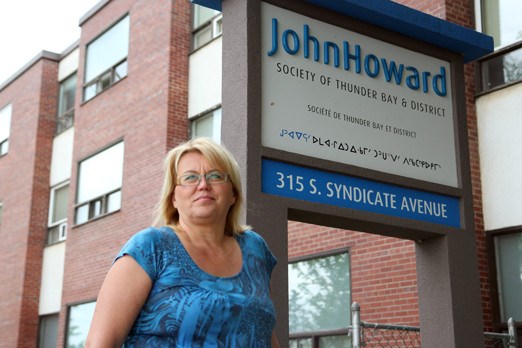Bridget Perrier got her diploma from Simpson Street High.
Her major, at 12-years old, was prostitution.
Simpson Street High is not a real facility, nor does it belong to any school board. But as other children studied math and science, Perrier was learning a tough lesson on the street.
“I was really well known in Thunder Bay on the Simpson Street strip,” she says of the stretch of road infamous for sex solicitation. “I was a moneymaker girl. A bad night for me would be making $500.”
Sexually abused by a family friend when she was eight years old, Perrier entered a group home and developed behavioural problems. With the other girls in the home older than she was, Perrier says she was eventually groomed and lured into prostitution.
By the time she was 12, she was working on the street.
Her life spiraled downwards from there. At 16, she had a baby boy named Tanner, who at nine months was diagnosed with leukemia.
The streets were her only form of support.
“Thunder Bay didn’t know what to do with me,” she says. “I was dealing with children’s aid workers who didn’t understand why I was, in their eyes, choosing to act out, which I wasn’t. It was the circumstances of a childhood trauma that led me to do this destructive behaviour.
“There was no understanding; there was just a lot of blame.”
Perrier’s life today is a different story.
She received an education, from the very real George Brown College in Toronto where she received a diploma from the school's community worker program. She also has three daughters and co-founded Sex Trade 101, an organization working to dispel the myths around prostitution and help women who want to escape the sex trade.
Along with fellow founding member and executive director of Sex Trade 101 Natasha Falle, Perrier will be speaking at an education seminar hosted by the John Howard Society Tuesday at the Da Vinci Centre called Escaping the Streets.
People need to start seeing prostitutes as victims, not as perpetrators, Perrier said.
She hopes by sharing her own story, people will see the long-lasting effects the sex trade has on women.
As Perrier got older, she became an adult offender and had no idea what she was getting herself into.
“My boy was dying of cancer. His wish was to go to Disney World. Well, I ended up in the district jail for six months,” she says.
She made a promise to her son on his deathbed to get her life straightened out.
After Tanner died, there was nothing left for her in Thunder Bay and she moved to Toronto, where she found healing within the city’s Aboriginal community. But what changed her entire outlook on life for good was when she had her first daughter and got a second chance at motherhood.
“The day I changed my daughter’s pamper, I felt that it would kill me to see someone violate her. I made a pact that I would better myself.”
While attending college, she became involved with a man who was a single father. His daughter’s mother was living in Vancouver and one day disappeared.
“She was one of the first women that Robert Pickton was charged with murdering and I realized that was happening a lot in the First Nation communities. Women were disappearing and not given that voice,” she says.
After securing frontline work, Perrier met Falle and eventually Sex Trade 101 was born.
The two are trying to change society’s view of women working the streets from deviants to victims.
“Little girls don’t aspire to be prostitutes. It’s not something you discuss in Grade 3 when your teacher asks what you want to be when you grow up,” says Perrier.
Of the 400 women the two women have worked with, 97 per cent said they wanted out of the sex trade.
“That’s what Natasha and I want to bring to Thunder Bay,” she adds. “If they are willing to truthfully look into what is going on in their beautiful city and deal with this issue and not blame victims.”
The John Howard Society’s executive director Liisa Leskowski said they hope to gain some knowledge on how to deal with the issue in the community.
“All of us know that when we drive around certain parts of the city, we’re aware that it’s happening,” she says.
“There are very little resources and support to help women at risk.”
“We want to make sure that we, as a frontline service provider, are delivering services that help the most vulnerable and risk-prone members of our society,” Leskowski adds.
John Howard runs a housing program for men and women who have been in conflict with the law. They opened a nine-bed women’s wing a year ago and have so far housed 50 women.
Leskowski says the program is for women that have no other options.
“We provide a safe living environment and opportunities for women to make choices for moving forward in their lives,” she says.
As a community, Leskowski thinks they’re at a loss on how to address the issue.
“As an agency, because we’re providing housing, we too are feeling like where do we start? We’re hoping some of the work Natasha and Bridget have already done will help move us forward,” she says.
Escaping the Streets starts at 5:30 p.m. at the Da Vinci Centre on June 19. Tickets are $35 and available by calling the John Howard Society at 623-5355. The price of the ticket covers the cost of the event and goes towards John Howard programming and services.
On Twitter: @JodiL_reporter
